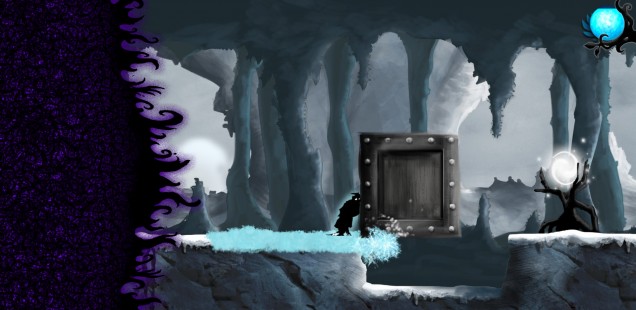
Off The Grid: Nihilumbra
Zachary Brictson tells the narrator to stop inhaling the paint fumes.
Born into the pits of the world, Nihilumbra begins as you take your leave of this so called void. But you belong to it, says the narrator, as you continue scrolling right, frame after frame, until you’ve left your birthplace behind to the see the world for the very first time. The formless blob you control decides to mimic the shape of the first humanoid figure it sees: a scarecrow. This turns you into a wispy, black silhouette, ready to learn to maneuver the harsh environments ahead.
Nihilumbra features a lot of typical platforming mechanisms – trampoline jumps, wall hopping and crate pushing – but gives you access to them through magical painting. Each chapter introduces a new environment, and within it a new color to learn. Painting with blue can make surfaces slippery, giving you extra boosts of speed to jump long gaps, sliding metal crates that are too heavy to push, or similarly, sliding nasty creatures off cliffs. Painting with green can make that same ground bouncy, allowing you to build momentum. Just a brush of the cursor, and most of the game’s challenges are easily and enjoyably solved.
The format of each chapter generally contains an introduction to a color’s uses, basic puzzle platforming that utilizes its functionality and a finale that has you run from the void, the velvet abyss seemingly chasing you wherever you go. As it creeps across the screen, you’ll have to use multiple colors, like a sticky brown paint to hold objects in place, or a yellow that draws up magnetic fields to pull you along and towards your escape. Broiling deserts and cold mountain tops send fierce wind against you, while dreary meadows are home to all sorts of monsters from the void. Simple animation and glossy graphical layers help each environment pop, but with each one you leave behind, the void will swallow it from existence.
Nihilumbra is a guilt trip. In your search for a place to call home, you destroy the lands you pass through. You kill your brethren from the void in order to advance, and this makes you feel sad, or so says the narrator. That’s right, you never left him behind. His voice follows you through the whole game, the meaning behind his words hopelessly vague, which is a crime against such a thematically simple adventure.
In one screen he’ll remark on how brave you are, in the next he’ll make presumptions about how you feel about the game and all it’s scenery. Then the voice will talk about how you’ll never make it, that you’ll never escape the void. Oddest of all is when the script directly addresses you as a player, scoffing at how willing you are to push forward without direction. It’s incredibly obnoxious and serves no real purpose.
Worse yet is that many screens don’t offer anything to conquer, having you reach the end of a frame before the narrator has finished his lines, thus skipping his audio. Therefore, not only do you have to put up with the poor writing, but you have to stop playing to make time for it. How very introspective.
Zachary Brictson is a Computer Science graduate from Northern Illinois University who chooses to write about games rather than code them, contributing to physical publications like The Printed Blog, sites such as Playstation Universe, and his own blog, Up Magic.